University Health and Social Care: Cancer and Diabetes Management
VerifiedAdded on 2023/01/17
|10
|2633
|69
Report
AI Summary
This report, titled "Health and Social Care Management: Cancer and Diabetes Discussion," provides a detailed overview of two significant physiological disorders: diabetes and cancer. It begins with introductions to both conditions, defining them and highlighting the affected body systems. The report then explores the causes, signs, and symptoms of each disorder, encompassing inherited traits, lifestyle choices, diet, and environmental factors. It delves into the impact of diabetes and cancer on various body systems and functions, including the circulatory, excretory, and neurological systems. Furthermore, the report examines the physical, intellectual, emotional, and social impacts of these disorders on individuals, discussing complications such as heart issues, mental health effects, and social challenges. The conclusion emphasizes the importance of understanding these disorders and their effects on quality of life, including a comprehensive bibliography of cited sources. This assignment, contributed by a student, is designed to help students learn about these important physiological disorders. The report offers valuable insights into the management of these complex conditions.
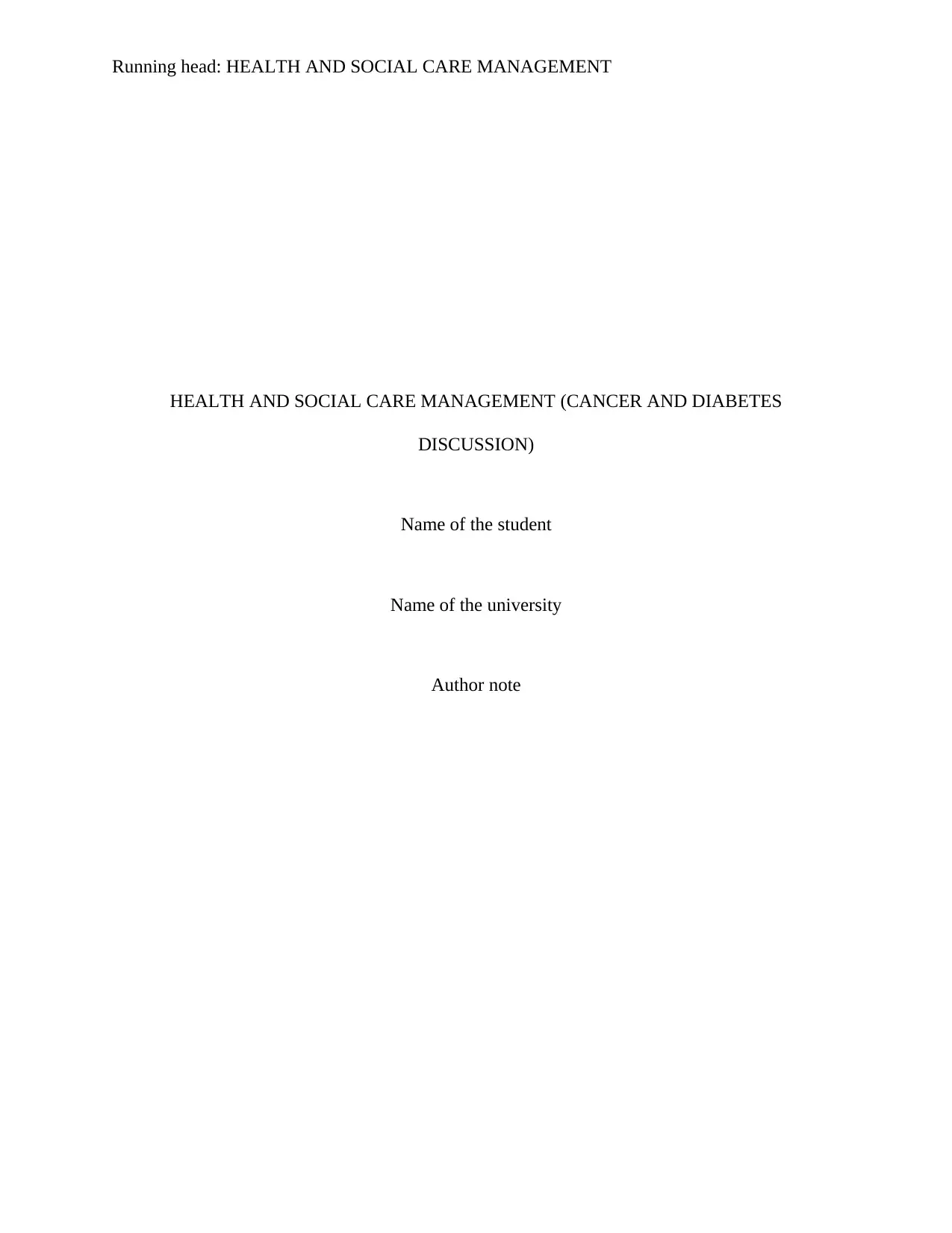
Running head: HEALTH AND SOCIAL CARE MANAGEMENT
HEALTH AND SOCIAL CARE MANAGEMENT (CANCER AND DIABETES
DISCUSSION)
Name of the student
Name of the university
Author note
HEALTH AND SOCIAL CARE MANAGEMENT (CANCER AND DIABETES
DISCUSSION)
Name of the student
Name of the university
Author note
Paraphrase This Document
Need a fresh take? Get an instant paraphrase of this document with our AI Paraphraser
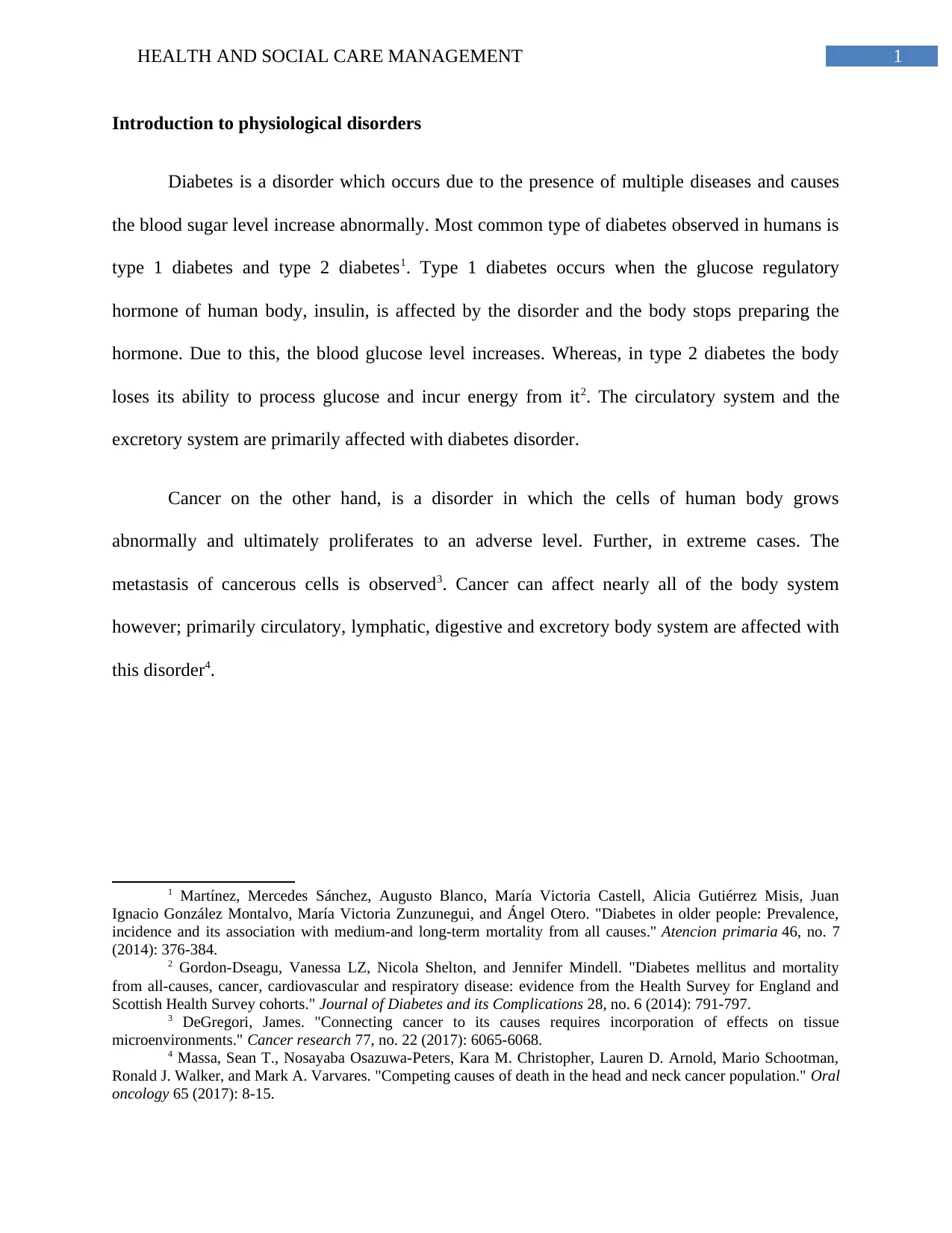
1HEALTH AND SOCIAL CARE MANAGEMENT
Introduction to physiological disorders
Diabetes is a disorder which occurs due to the presence of multiple diseases and causes
the blood sugar level increase abnormally. Most common type of diabetes observed in humans is
type 1 diabetes and type 2 diabetes1. Type 1 diabetes occurs when the glucose regulatory
hormone of human body, insulin, is affected by the disorder and the body stops preparing the
hormone. Due to this, the blood glucose level increases. Whereas, in type 2 diabetes the body
loses its ability to process glucose and incur energy from it2. The circulatory system and the
excretory system are primarily affected with diabetes disorder.
Cancer on the other hand, is a disorder in which the cells of human body grows
abnormally and ultimately proliferates to an adverse level. Further, in extreme cases. The
metastasis of cancerous cells is observed3. Cancer can affect nearly all of the body system
however; primarily circulatory, lymphatic, digestive and excretory body system are affected with
this disorder4.
1 Martínez, Mercedes Sánchez, Augusto Blanco, María Victoria Castell, Alicia Gutiérrez Misis, Juan
Ignacio González Montalvo, María Victoria Zunzunegui, and Ángel Otero. "Diabetes in older people: Prevalence,
incidence and its association with medium-and long-term mortality from all causes." Atencion primaria 46, no. 7
(2014): 376-384.
2 Gordon-Dseagu, Vanessa LZ, Nicola Shelton, and Jennifer Mindell. "Diabetes mellitus and mortality
from all-causes, cancer, cardiovascular and respiratory disease: evidence from the Health Survey for England and
Scottish Health Survey cohorts." Journal of Diabetes and its Complications 28, no. 6 (2014): 791-797.
3 DeGregori, James. "Connecting cancer to its causes requires incorporation of effects on tissue
microenvironments." Cancer research 77, no. 22 (2017): 6065-6068.
4 Massa, Sean T., Nosayaba Osazuwa-Peters, Kara M. Christopher, Lauren D. Arnold, Mario Schootman,
Ronald J. Walker, and Mark A. Varvares. "Competing causes of death in the head and neck cancer population." Oral
oncology 65 (2017): 8-15.
Introduction to physiological disorders
Diabetes is a disorder which occurs due to the presence of multiple diseases and causes
the blood sugar level increase abnormally. Most common type of diabetes observed in humans is
type 1 diabetes and type 2 diabetes1. Type 1 diabetes occurs when the glucose regulatory
hormone of human body, insulin, is affected by the disorder and the body stops preparing the
hormone. Due to this, the blood glucose level increases. Whereas, in type 2 diabetes the body
loses its ability to process glucose and incur energy from it2. The circulatory system and the
excretory system are primarily affected with diabetes disorder.
Cancer on the other hand, is a disorder in which the cells of human body grows
abnormally and ultimately proliferates to an adverse level. Further, in extreme cases. The
metastasis of cancerous cells is observed3. Cancer can affect nearly all of the body system
however; primarily circulatory, lymphatic, digestive and excretory body system are affected with
this disorder4.
1 Martínez, Mercedes Sánchez, Augusto Blanco, María Victoria Castell, Alicia Gutiérrez Misis, Juan
Ignacio González Montalvo, María Victoria Zunzunegui, and Ángel Otero. "Diabetes in older people: Prevalence,
incidence and its association with medium-and long-term mortality from all causes." Atencion primaria 46, no. 7
(2014): 376-384.
2 Gordon-Dseagu, Vanessa LZ, Nicola Shelton, and Jennifer Mindell. "Diabetes mellitus and mortality
from all-causes, cancer, cardiovascular and respiratory disease: evidence from the Health Survey for England and
Scottish Health Survey cohorts." Journal of Diabetes and its Complications 28, no. 6 (2014): 791-797.
3 DeGregori, James. "Connecting cancer to its causes requires incorporation of effects on tissue
microenvironments." Cancer research 77, no. 22 (2017): 6065-6068.
4 Massa, Sean T., Nosayaba Osazuwa-Peters, Kara M. Christopher, Lauren D. Arnold, Mario Schootman,
Ronald J. Walker, and Mark A. Varvares. "Competing causes of death in the head and neck cancer population." Oral
oncology 65 (2017): 8-15.
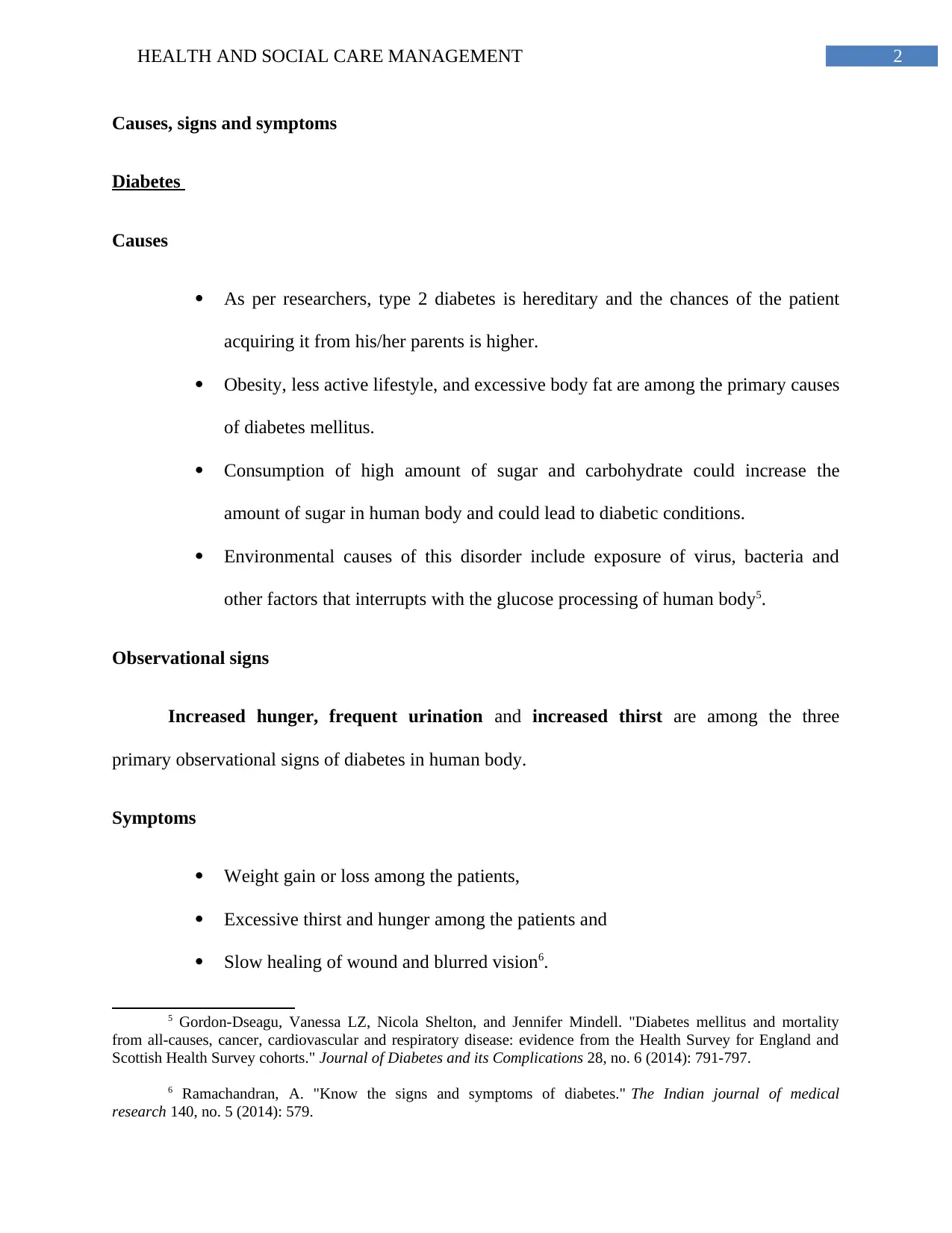
2HEALTH AND SOCIAL CARE MANAGEMENT
Causes, signs and symptoms
Diabetes
Causes
As per researchers, type 2 diabetes is hereditary and the chances of the patient
acquiring it from his/her parents is higher.
Obesity, less active lifestyle, and excessive body fat are among the primary causes
of diabetes mellitus.
Consumption of high amount of sugar and carbohydrate could increase the
amount of sugar in human body and could lead to diabetic conditions.
Environmental causes of this disorder include exposure of virus, bacteria and
other factors that interrupts with the glucose processing of human body5.
Observational signs
Increased hunger, frequent urination and increased thirst are among the three
primary observational signs of diabetes in human body.
Symptoms
Weight gain or loss among the patients,
Excessive thirst and hunger among the patients and
Slow healing of wound and blurred vision6.
5 Gordon-Dseagu, Vanessa LZ, Nicola Shelton, and Jennifer Mindell. "Diabetes mellitus and mortality
from all-causes, cancer, cardiovascular and respiratory disease: evidence from the Health Survey for England and
Scottish Health Survey cohorts." Journal of Diabetes and its Complications 28, no. 6 (2014): 791-797.
6 Ramachandran, A. "Know the signs and symptoms of diabetes." The Indian journal of medical
research 140, no. 5 (2014): 579.
Causes, signs and symptoms
Diabetes
Causes
As per researchers, type 2 diabetes is hereditary and the chances of the patient
acquiring it from his/her parents is higher.
Obesity, less active lifestyle, and excessive body fat are among the primary causes
of diabetes mellitus.
Consumption of high amount of sugar and carbohydrate could increase the
amount of sugar in human body and could lead to diabetic conditions.
Environmental causes of this disorder include exposure of virus, bacteria and
other factors that interrupts with the glucose processing of human body5.
Observational signs
Increased hunger, frequent urination and increased thirst are among the three
primary observational signs of diabetes in human body.
Symptoms
Weight gain or loss among the patients,
Excessive thirst and hunger among the patients and
Slow healing of wound and blurred vision6.
5 Gordon-Dseagu, Vanessa LZ, Nicola Shelton, and Jennifer Mindell. "Diabetes mellitus and mortality
from all-causes, cancer, cardiovascular and respiratory disease: evidence from the Health Survey for England and
Scottish Health Survey cohorts." Journal of Diabetes and its Complications 28, no. 6 (2014): 791-797.
6 Ramachandran, A. "Know the signs and symptoms of diabetes." The Indian journal of medical
research 140, no. 5 (2014): 579.
⊘ This is a preview!⊘
Do you want full access?
Subscribe today to unlock all pages.

Trusted by 1+ million students worldwide
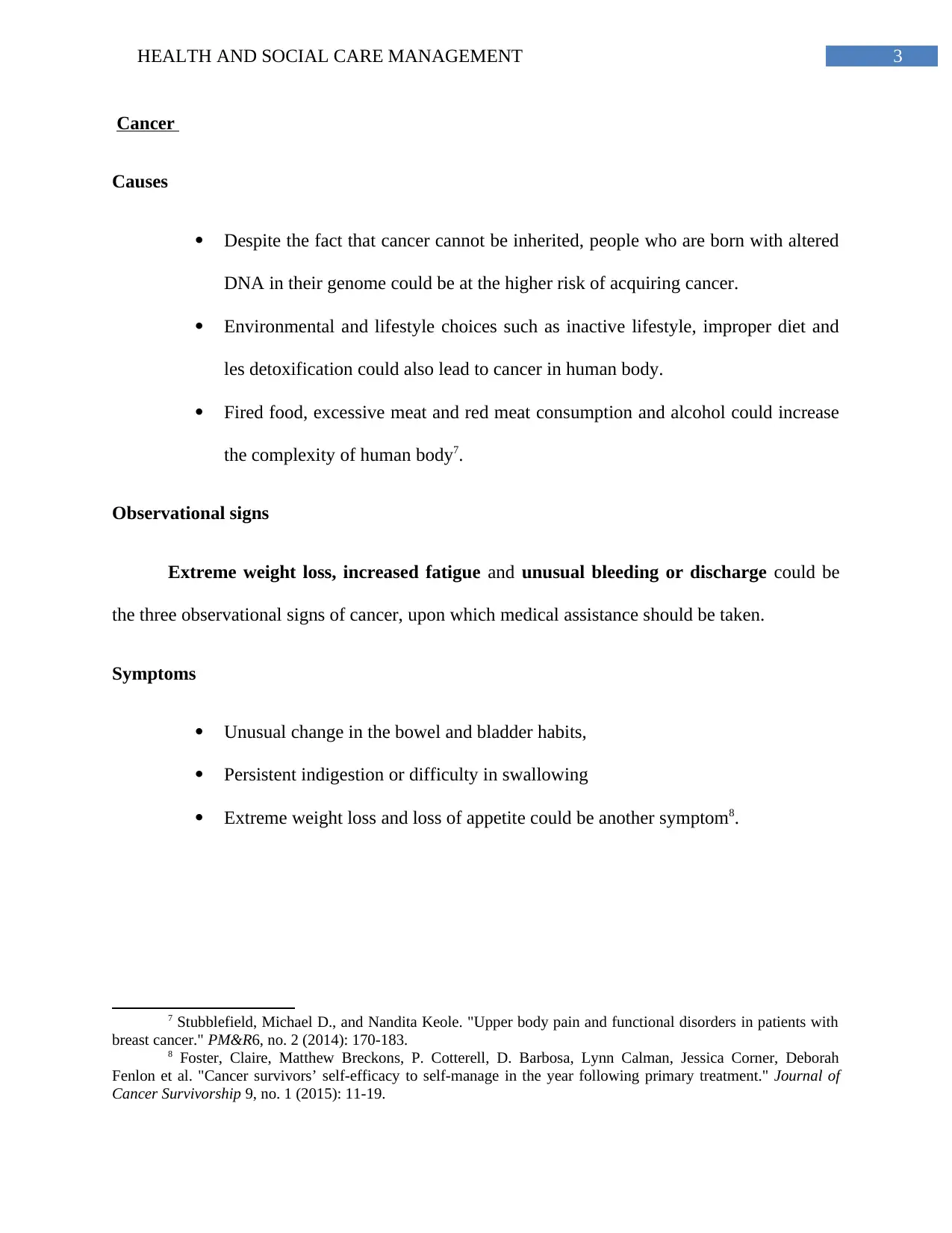
3HEALTH AND SOCIAL CARE MANAGEMENT
Cancer
Causes
Despite the fact that cancer cannot be inherited, people who are born with altered
DNA in their genome could be at the higher risk of acquiring cancer.
Environmental and lifestyle choices such as inactive lifestyle, improper diet and
les detoxification could also lead to cancer in human body.
Fired food, excessive meat and red meat consumption and alcohol could increase
the complexity of human body7.
Observational signs
Extreme weight loss, increased fatigue and unusual bleeding or discharge could be
the three observational signs of cancer, upon which medical assistance should be taken.
Symptoms
Unusual change in the bowel and bladder habits,
Persistent indigestion or difficulty in swallowing
Extreme weight loss and loss of appetite could be another symptom8.
7 Stubblefield, Michael D., and Nandita Keole. "Upper body pain and functional disorders in patients with
breast cancer." PM&R6, no. 2 (2014): 170-183.
8 Foster, Claire, Matthew Breckons, P. Cotterell, D. Barbosa, Lynn Calman, Jessica Corner, Deborah
Fenlon et al. "Cancer survivors’ self-efficacy to self-manage in the year following primary treatment." Journal of
Cancer Survivorship 9, no. 1 (2015): 11-19.
Cancer
Causes
Despite the fact that cancer cannot be inherited, people who are born with altered
DNA in their genome could be at the higher risk of acquiring cancer.
Environmental and lifestyle choices such as inactive lifestyle, improper diet and
les detoxification could also lead to cancer in human body.
Fired food, excessive meat and red meat consumption and alcohol could increase
the complexity of human body7.
Observational signs
Extreme weight loss, increased fatigue and unusual bleeding or discharge could be
the three observational signs of cancer, upon which medical assistance should be taken.
Symptoms
Unusual change in the bowel and bladder habits,
Persistent indigestion or difficulty in swallowing
Extreme weight loss and loss of appetite could be another symptom8.
7 Stubblefield, Michael D., and Nandita Keole. "Upper body pain and functional disorders in patients with
breast cancer." PM&R6, no. 2 (2014): 170-183.
8 Foster, Claire, Matthew Breckons, P. Cotterell, D. Barbosa, Lynn Calman, Jessica Corner, Deborah
Fenlon et al. "Cancer survivors’ self-efficacy to self-manage in the year following primary treatment." Journal of
Cancer Survivorship 9, no. 1 (2015): 11-19.
Paraphrase This Document
Need a fresh take? Get an instant paraphrase of this document with our AI Paraphraser
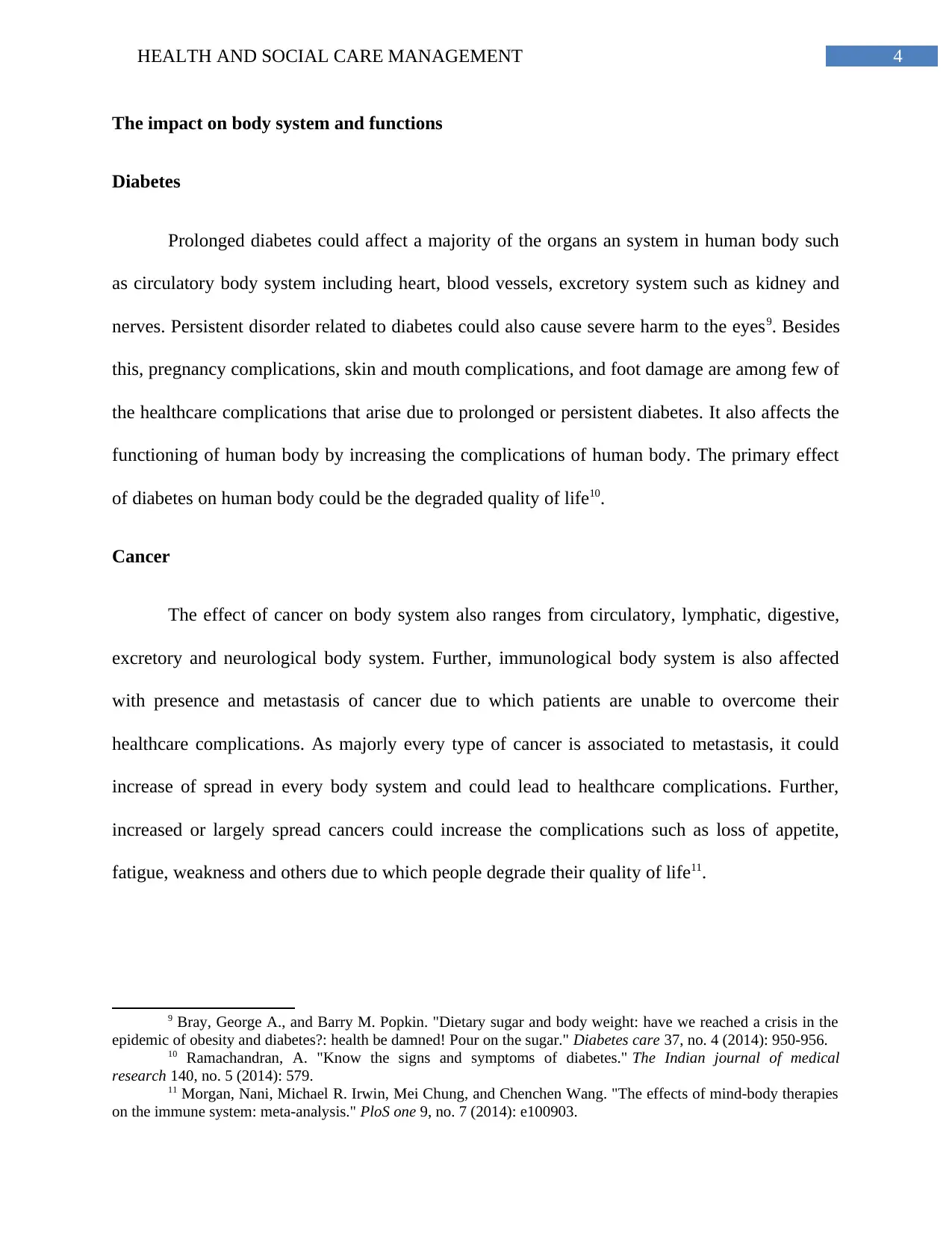
4HEALTH AND SOCIAL CARE MANAGEMENT
The impact on body system and functions
Diabetes
Prolonged diabetes could affect a majority of the organs an system in human body such
as circulatory body system including heart, blood vessels, excretory system such as kidney and
nerves. Persistent disorder related to diabetes could also cause severe harm to the eyes9. Besides
this, pregnancy complications, skin and mouth complications, and foot damage are among few of
the healthcare complications that arise due to prolonged or persistent diabetes. It also affects the
functioning of human body by increasing the complications of human body. The primary effect
of diabetes on human body could be the degraded quality of life10.
Cancer
The effect of cancer on body system also ranges from circulatory, lymphatic, digestive,
excretory and neurological body system. Further, immunological body system is also affected
with presence and metastasis of cancer due to which patients are unable to overcome their
healthcare complications. As majorly every type of cancer is associated to metastasis, it could
increase of spread in every body system and could lead to healthcare complications. Further,
increased or largely spread cancers could increase the complications such as loss of appetite,
fatigue, weakness and others due to which people degrade their quality of life11.
9 Bray, George A., and Barry M. Popkin. "Dietary sugar and body weight: have we reached a crisis in the
epidemic of obesity and diabetes?: health be damned! Pour on the sugar." Diabetes care 37, no. 4 (2014): 950-956.
10 Ramachandran, A. "Know the signs and symptoms of diabetes." The Indian journal of medical
research 140, no. 5 (2014): 579.
11 Morgan, Nani, Michael R. Irwin, Mei Chung, and Chenchen Wang. "The effects of mind-body therapies
on the immune system: meta-analysis." PloS one 9, no. 7 (2014): e100903.
The impact on body system and functions
Diabetes
Prolonged diabetes could affect a majority of the organs an system in human body such
as circulatory body system including heart, blood vessels, excretory system such as kidney and
nerves. Persistent disorder related to diabetes could also cause severe harm to the eyes9. Besides
this, pregnancy complications, skin and mouth complications, and foot damage are among few of
the healthcare complications that arise due to prolonged or persistent diabetes. It also affects the
functioning of human body by increasing the complications of human body. The primary effect
of diabetes on human body could be the degraded quality of life10.
Cancer
The effect of cancer on body system also ranges from circulatory, lymphatic, digestive,
excretory and neurological body system. Further, immunological body system is also affected
with presence and metastasis of cancer due to which patients are unable to overcome their
healthcare complications. As majorly every type of cancer is associated to metastasis, it could
increase of spread in every body system and could lead to healthcare complications. Further,
increased or largely spread cancers could increase the complications such as loss of appetite,
fatigue, weakness and others due to which people degrade their quality of life11.
9 Bray, George A., and Barry M. Popkin. "Dietary sugar and body weight: have we reached a crisis in the
epidemic of obesity and diabetes?: health be damned! Pour on the sugar." Diabetes care 37, no. 4 (2014): 950-956.
10 Ramachandran, A. "Know the signs and symptoms of diabetes." The Indian journal of medical
research 140, no. 5 (2014): 579.
11 Morgan, Nani, Michael R. Irwin, Mei Chung, and Chenchen Wang. "The effects of mind-body therapies
on the immune system: meta-analysis." PloS one 9, no. 7 (2014): e100903.
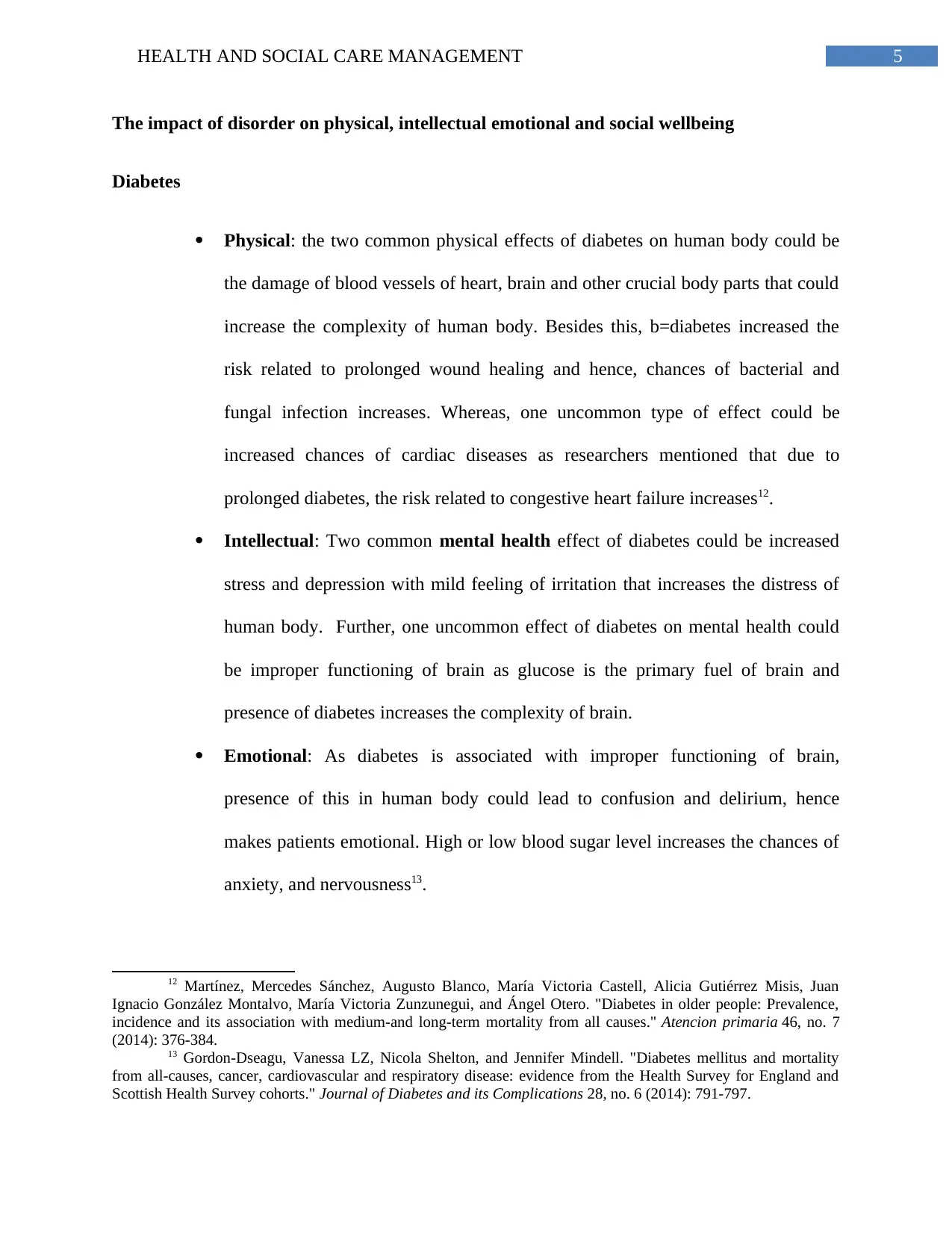
5HEALTH AND SOCIAL CARE MANAGEMENT
The impact of disorder on physical, intellectual emotional and social wellbeing
Diabetes
Physical: the two common physical effects of diabetes on human body could be
the damage of blood vessels of heart, brain and other crucial body parts that could
increase the complexity of human body. Besides this, b=diabetes increased the
risk related to prolonged wound healing and hence, chances of bacterial and
fungal infection increases. Whereas, one uncommon type of effect could be
increased chances of cardiac diseases as researchers mentioned that due to
prolonged diabetes, the risk related to congestive heart failure increases12.
Intellectual: Two common mental health effect of diabetes could be increased
stress and depression with mild feeling of irritation that increases the distress of
human body. Further, one uncommon effect of diabetes on mental health could
be improper functioning of brain as glucose is the primary fuel of brain and
presence of diabetes increases the complexity of brain.
Emotional: As diabetes is associated with improper functioning of brain,
presence of this in human body could lead to confusion and delirium, hence
makes patients emotional. High or low blood sugar level increases the chances of
anxiety, and nervousness13.
12 Martínez, Mercedes Sánchez, Augusto Blanco, María Victoria Castell, Alicia Gutiérrez Misis, Juan
Ignacio González Montalvo, María Victoria Zunzunegui, and Ángel Otero. "Diabetes in older people: Prevalence,
incidence and its association with medium-and long-term mortality from all causes." Atencion primaria 46, no. 7
(2014): 376-384.
13 Gordon-Dseagu, Vanessa LZ, Nicola Shelton, and Jennifer Mindell. "Diabetes mellitus and mortality
from all-causes, cancer, cardiovascular and respiratory disease: evidence from the Health Survey for England and
Scottish Health Survey cohorts." Journal of Diabetes and its Complications 28, no. 6 (2014): 791-797.
The impact of disorder on physical, intellectual emotional and social wellbeing
Diabetes
Physical: the two common physical effects of diabetes on human body could be
the damage of blood vessels of heart, brain and other crucial body parts that could
increase the complexity of human body. Besides this, b=diabetes increased the
risk related to prolonged wound healing and hence, chances of bacterial and
fungal infection increases. Whereas, one uncommon type of effect could be
increased chances of cardiac diseases as researchers mentioned that due to
prolonged diabetes, the risk related to congestive heart failure increases12.
Intellectual: Two common mental health effect of diabetes could be increased
stress and depression with mild feeling of irritation that increases the distress of
human body. Further, one uncommon effect of diabetes on mental health could
be improper functioning of brain as glucose is the primary fuel of brain and
presence of diabetes increases the complexity of brain.
Emotional: As diabetes is associated with improper functioning of brain,
presence of this in human body could lead to confusion and delirium, hence
makes patients emotional. High or low blood sugar level increases the chances of
anxiety, and nervousness13.
12 Martínez, Mercedes Sánchez, Augusto Blanco, María Victoria Castell, Alicia Gutiérrez Misis, Juan
Ignacio González Montalvo, María Victoria Zunzunegui, and Ángel Otero. "Diabetes in older people: Prevalence,
incidence and its association with medium-and long-term mortality from all causes." Atencion primaria 46, no. 7
(2014): 376-384.
13 Gordon-Dseagu, Vanessa LZ, Nicola Shelton, and Jennifer Mindell. "Diabetes mellitus and mortality
from all-causes, cancer, cardiovascular and respiratory disease: evidence from the Health Survey for England and
Scottish Health Survey cohorts." Journal of Diabetes and its Complications 28, no. 6 (2014): 791-797.
⊘ This is a preview!⊘
Do you want full access?
Subscribe today to unlock all pages.

Trusted by 1+ million students worldwide
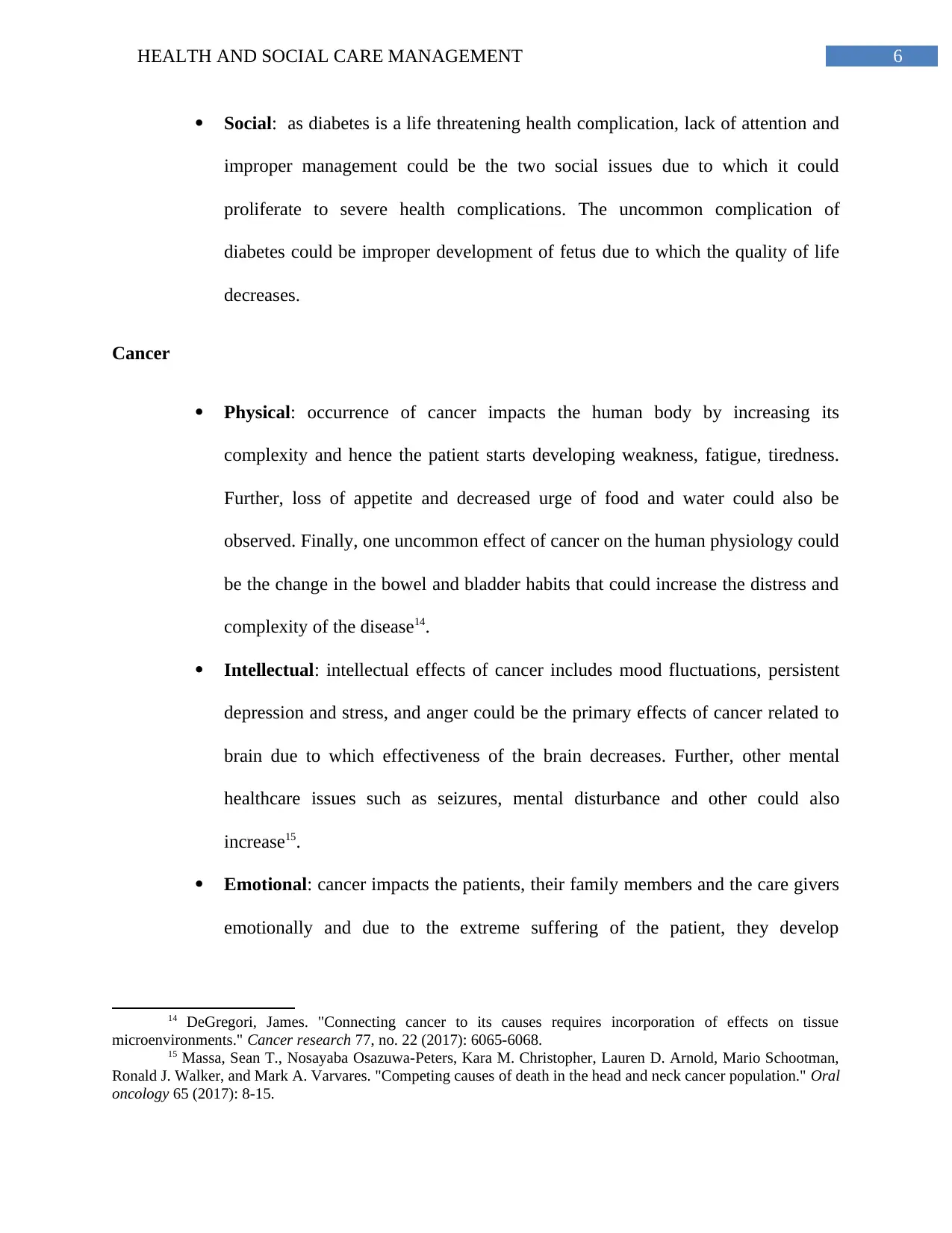
6HEALTH AND SOCIAL CARE MANAGEMENT
Social: as diabetes is a life threatening health complication, lack of attention and
improper management could be the two social issues due to which it could
proliferate to severe health complications. The uncommon complication of
diabetes could be improper development of fetus due to which the quality of life
decreases.
Cancer
Physical: occurrence of cancer impacts the human body by increasing its
complexity and hence the patient starts developing weakness, fatigue, tiredness.
Further, loss of appetite and decreased urge of food and water could also be
observed. Finally, one uncommon effect of cancer on the human physiology could
be the change in the bowel and bladder habits that could increase the distress and
complexity of the disease14.
Intellectual: intellectual effects of cancer includes mood fluctuations, persistent
depression and stress, and anger could be the primary effects of cancer related to
brain due to which effectiveness of the brain decreases. Further, other mental
healthcare issues such as seizures, mental disturbance and other could also
increase15.
Emotional: cancer impacts the patients, their family members and the care givers
emotionally and due to the extreme suffering of the patient, they develop
14 DeGregori, James. "Connecting cancer to its causes requires incorporation of effects on tissue
microenvironments." Cancer research 77, no. 22 (2017): 6065-6068.
15 Massa, Sean T., Nosayaba Osazuwa-Peters, Kara M. Christopher, Lauren D. Arnold, Mario Schootman,
Ronald J. Walker, and Mark A. Varvares. "Competing causes of death in the head and neck cancer population." Oral
oncology 65 (2017): 8-15.
Social: as diabetes is a life threatening health complication, lack of attention and
improper management could be the two social issues due to which it could
proliferate to severe health complications. The uncommon complication of
diabetes could be improper development of fetus due to which the quality of life
decreases.
Cancer
Physical: occurrence of cancer impacts the human body by increasing its
complexity and hence the patient starts developing weakness, fatigue, tiredness.
Further, loss of appetite and decreased urge of food and water could also be
observed. Finally, one uncommon effect of cancer on the human physiology could
be the change in the bowel and bladder habits that could increase the distress and
complexity of the disease14.
Intellectual: intellectual effects of cancer includes mood fluctuations, persistent
depression and stress, and anger could be the primary effects of cancer related to
brain due to which effectiveness of the brain decreases. Further, other mental
healthcare issues such as seizures, mental disturbance and other could also
increase15.
Emotional: cancer impacts the patients, their family members and the care givers
emotionally and due to the extreme suffering of the patient, they develop
14 DeGregori, James. "Connecting cancer to its causes requires incorporation of effects on tissue
microenvironments." Cancer research 77, no. 22 (2017): 6065-6068.
15 Massa, Sean T., Nosayaba Osazuwa-Peters, Kara M. Christopher, Lauren D. Arnold, Mario Schootman,
Ronald J. Walker, and Mark A. Varvares. "Competing causes of death in the head and neck cancer population." Oral
oncology 65 (2017): 8-15.
Paraphrase This Document
Need a fresh take? Get an instant paraphrase of this document with our AI Paraphraser
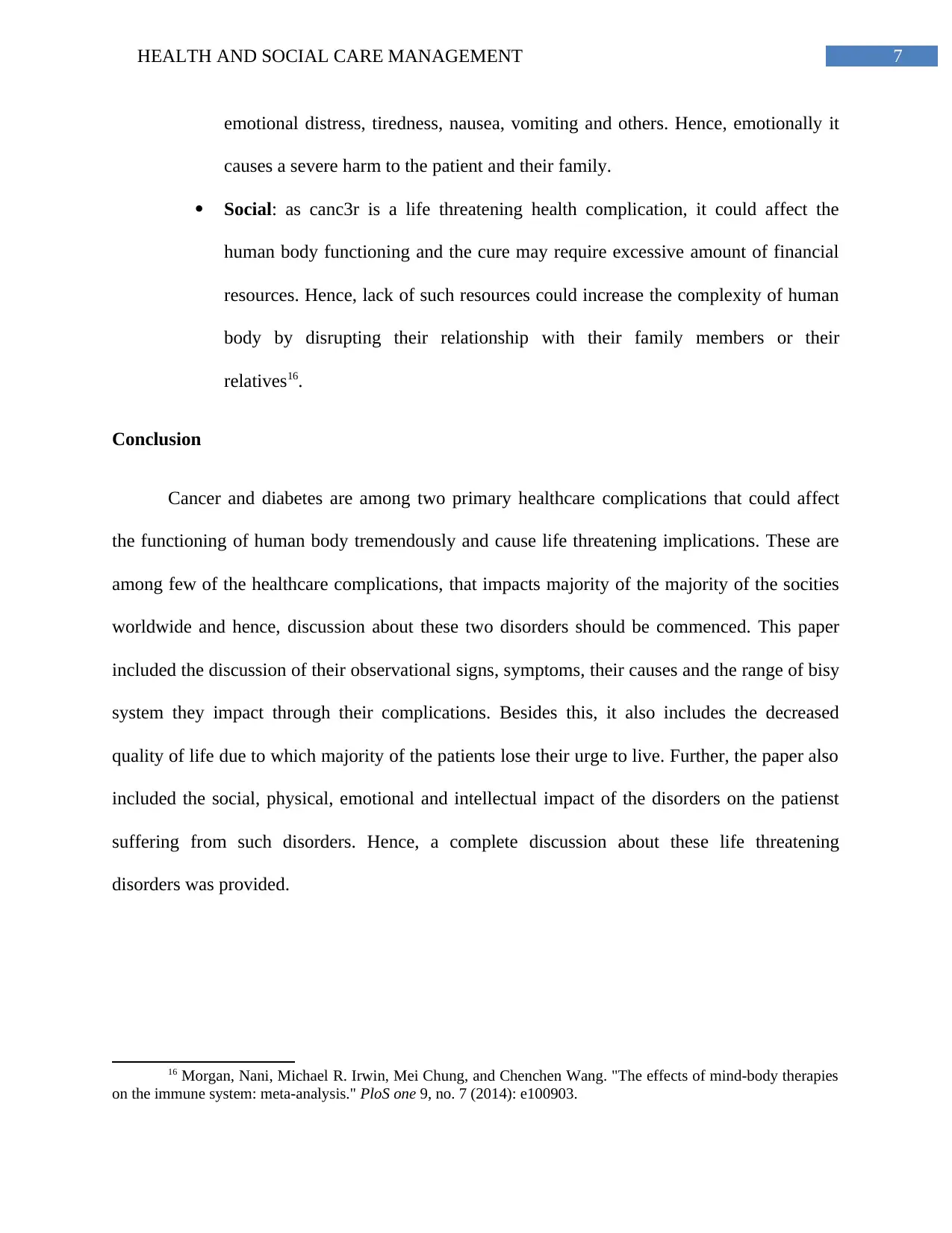
7HEALTH AND SOCIAL CARE MANAGEMENT
emotional distress, tiredness, nausea, vomiting and others. Hence, emotionally it
causes a severe harm to the patient and their family.
Social: as canc3r is a life threatening health complication, it could affect the
human body functioning and the cure may require excessive amount of financial
resources. Hence, lack of such resources could increase the complexity of human
body by disrupting their relationship with their family members or their
relatives16.
Conclusion
Cancer and diabetes are among two primary healthcare complications that could affect
the functioning of human body tremendously and cause life threatening implications. These are
among few of the healthcare complications, that impacts majority of the majority of the socities
worldwide and hence, discussion about these two disorders should be commenced. This paper
included the discussion of their observational signs, symptoms, their causes and the range of bisy
system they impact through their complications. Besides this, it also includes the decreased
quality of life due to which majority of the patients lose their urge to live. Further, the paper also
included the social, physical, emotional and intellectual impact of the disorders on the patienst
suffering from such disorders. Hence, a complete discussion about these life threatening
disorders was provided.
16 Morgan, Nani, Michael R. Irwin, Mei Chung, and Chenchen Wang. "The effects of mind-body therapies
on the immune system: meta-analysis." PloS one 9, no. 7 (2014): e100903.
emotional distress, tiredness, nausea, vomiting and others. Hence, emotionally it
causes a severe harm to the patient and their family.
Social: as canc3r is a life threatening health complication, it could affect the
human body functioning and the cure may require excessive amount of financial
resources. Hence, lack of such resources could increase the complexity of human
body by disrupting their relationship with their family members or their
relatives16.
Conclusion
Cancer and diabetes are among two primary healthcare complications that could affect
the functioning of human body tremendously and cause life threatening implications. These are
among few of the healthcare complications, that impacts majority of the majority of the socities
worldwide and hence, discussion about these two disorders should be commenced. This paper
included the discussion of their observational signs, symptoms, their causes and the range of bisy
system they impact through their complications. Besides this, it also includes the decreased
quality of life due to which majority of the patients lose their urge to live. Further, the paper also
included the social, physical, emotional and intellectual impact of the disorders on the patienst
suffering from such disorders. Hence, a complete discussion about these life threatening
disorders was provided.
16 Morgan, Nani, Michael R. Irwin, Mei Chung, and Chenchen Wang. "The effects of mind-body therapies
on the immune system: meta-analysis." PloS one 9, no. 7 (2014): e100903.
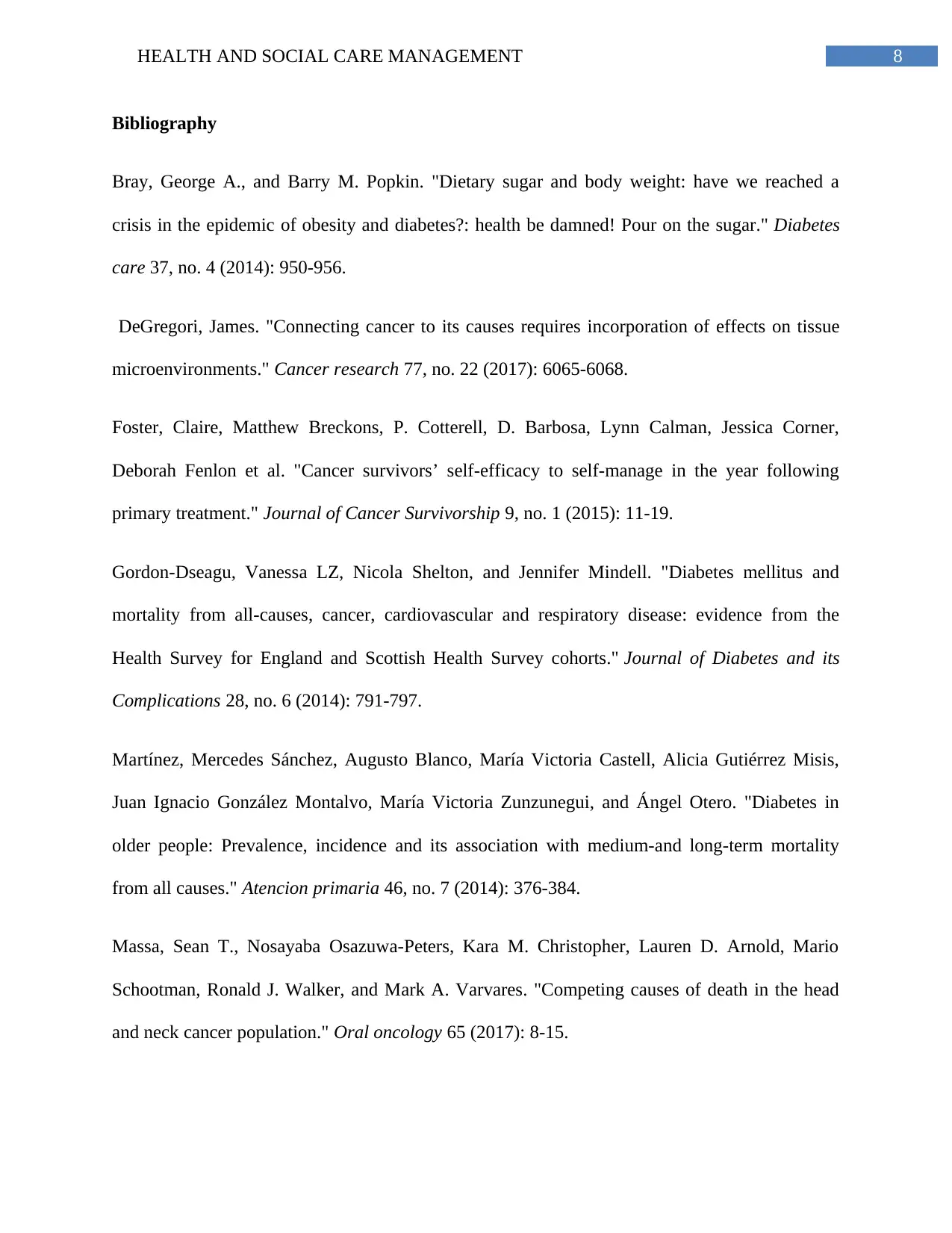
8HEALTH AND SOCIAL CARE MANAGEMENT
Bibliography
Bray, George A., and Barry M. Popkin. "Dietary sugar and body weight: have we reached a
crisis in the epidemic of obesity and diabetes?: health be damned! Pour on the sugar." Diabetes
care 37, no. 4 (2014): 950-956.
DeGregori, James. "Connecting cancer to its causes requires incorporation of effects on tissue
microenvironments." Cancer research 77, no. 22 (2017): 6065-6068.
Foster, Claire, Matthew Breckons, P. Cotterell, D. Barbosa, Lynn Calman, Jessica Corner,
Deborah Fenlon et al. "Cancer survivors’ self-efficacy to self-manage in the year following
primary treatment." Journal of Cancer Survivorship 9, no. 1 (2015): 11-19.
Gordon-Dseagu, Vanessa LZ, Nicola Shelton, and Jennifer Mindell. "Diabetes mellitus and
mortality from all-causes, cancer, cardiovascular and respiratory disease: evidence from the
Health Survey for England and Scottish Health Survey cohorts." Journal of Diabetes and its
Complications 28, no. 6 (2014): 791-797.
Martínez, Mercedes Sánchez, Augusto Blanco, María Victoria Castell, Alicia Gutiérrez Misis,
Juan Ignacio González Montalvo, María Victoria Zunzunegui, and Ángel Otero. "Diabetes in
older people: Prevalence, incidence and its association with medium-and long-term mortality
from all causes." Atencion primaria 46, no. 7 (2014): 376-384.
Massa, Sean T., Nosayaba Osazuwa-Peters, Kara M. Christopher, Lauren D. Arnold, Mario
Schootman, Ronald J. Walker, and Mark A. Varvares. "Competing causes of death in the head
and neck cancer population." Oral oncology 65 (2017): 8-15.
Bibliography
Bray, George A., and Barry M. Popkin. "Dietary sugar and body weight: have we reached a
crisis in the epidemic of obesity and diabetes?: health be damned! Pour on the sugar." Diabetes
care 37, no. 4 (2014): 950-956.
DeGregori, James. "Connecting cancer to its causes requires incorporation of effects on tissue
microenvironments." Cancer research 77, no. 22 (2017): 6065-6068.
Foster, Claire, Matthew Breckons, P. Cotterell, D. Barbosa, Lynn Calman, Jessica Corner,
Deborah Fenlon et al. "Cancer survivors’ self-efficacy to self-manage in the year following
primary treatment." Journal of Cancer Survivorship 9, no. 1 (2015): 11-19.
Gordon-Dseagu, Vanessa LZ, Nicola Shelton, and Jennifer Mindell. "Diabetes mellitus and
mortality from all-causes, cancer, cardiovascular and respiratory disease: evidence from the
Health Survey for England and Scottish Health Survey cohorts." Journal of Diabetes and its
Complications 28, no. 6 (2014): 791-797.
Martínez, Mercedes Sánchez, Augusto Blanco, María Victoria Castell, Alicia Gutiérrez Misis,
Juan Ignacio González Montalvo, María Victoria Zunzunegui, and Ángel Otero. "Diabetes in
older people: Prevalence, incidence and its association with medium-and long-term mortality
from all causes." Atencion primaria 46, no. 7 (2014): 376-384.
Massa, Sean T., Nosayaba Osazuwa-Peters, Kara M. Christopher, Lauren D. Arnold, Mario
Schootman, Ronald J. Walker, and Mark A. Varvares. "Competing causes of death in the head
and neck cancer population." Oral oncology 65 (2017): 8-15.
⊘ This is a preview!⊘
Do you want full access?
Subscribe today to unlock all pages.

Trusted by 1+ million students worldwide
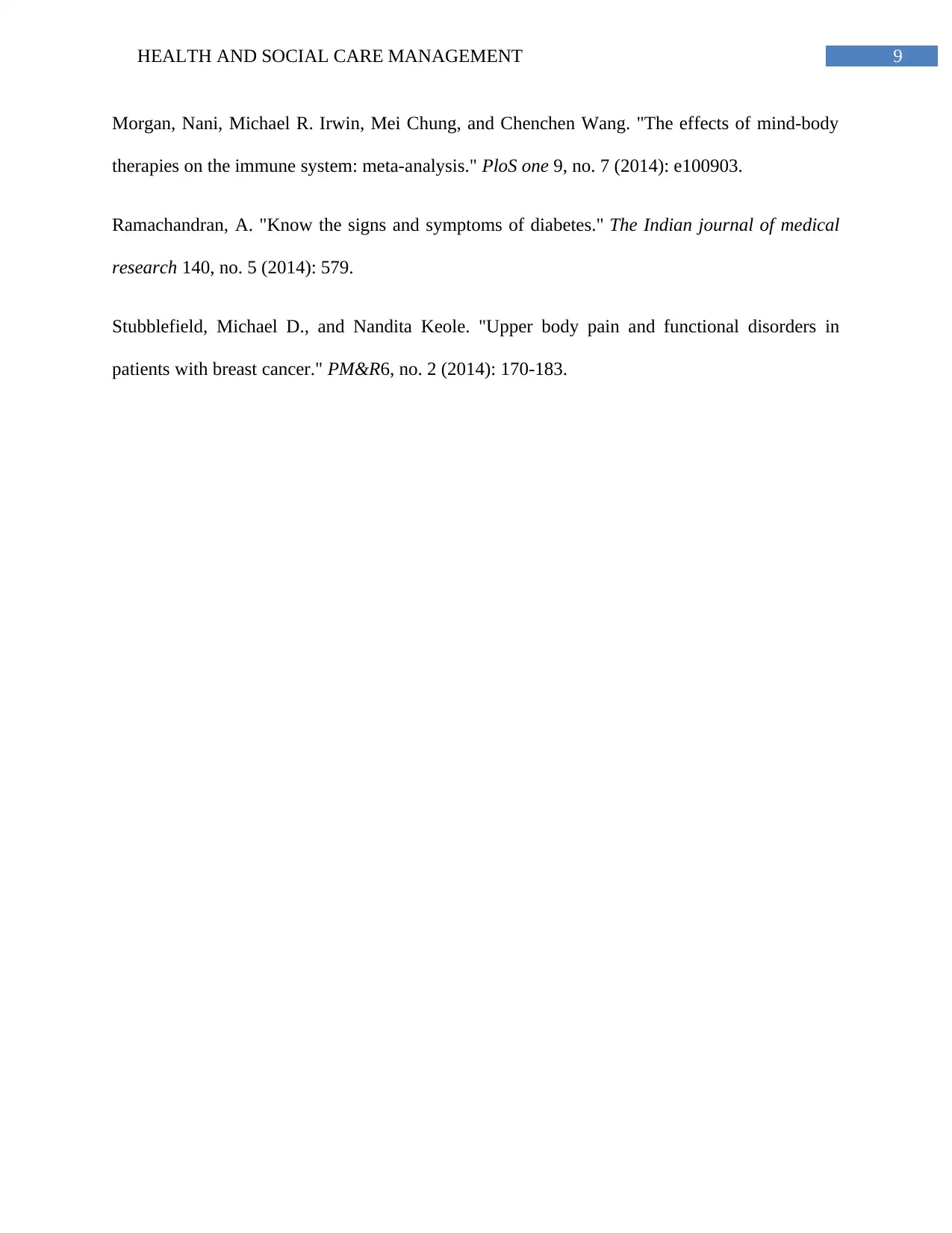
9HEALTH AND SOCIAL CARE MANAGEMENT
Morgan, Nani, Michael R. Irwin, Mei Chung, and Chenchen Wang. "The effects of mind-body
therapies on the immune system: meta-analysis." PloS one 9, no. 7 (2014): e100903.
Ramachandran, A. "Know the signs and symptoms of diabetes." The Indian journal of medical
research 140, no. 5 (2014): 579.
Stubblefield, Michael D., and Nandita Keole. "Upper body pain and functional disorders in
patients with breast cancer." PM&R6, no. 2 (2014): 170-183.
Morgan, Nani, Michael R. Irwin, Mei Chung, and Chenchen Wang. "The effects of mind-body
therapies on the immune system: meta-analysis." PloS one 9, no. 7 (2014): e100903.
Ramachandran, A. "Know the signs and symptoms of diabetes." The Indian journal of medical
research 140, no. 5 (2014): 579.
Stubblefield, Michael D., and Nandita Keole. "Upper body pain and functional disorders in
patients with breast cancer." PM&R6, no. 2 (2014): 170-183.
1 out of 10
Related Documents
Your All-in-One AI-Powered Toolkit for Academic Success.
+13062052269
info@desklib.com
Available 24*7 on WhatsApp / Email
![[object Object]](/_next/static/media/star-bottom.7253800d.svg)
Unlock your academic potential
Copyright © 2020–2026 A2Z Services. All Rights Reserved. Developed and managed by ZUCOL.





